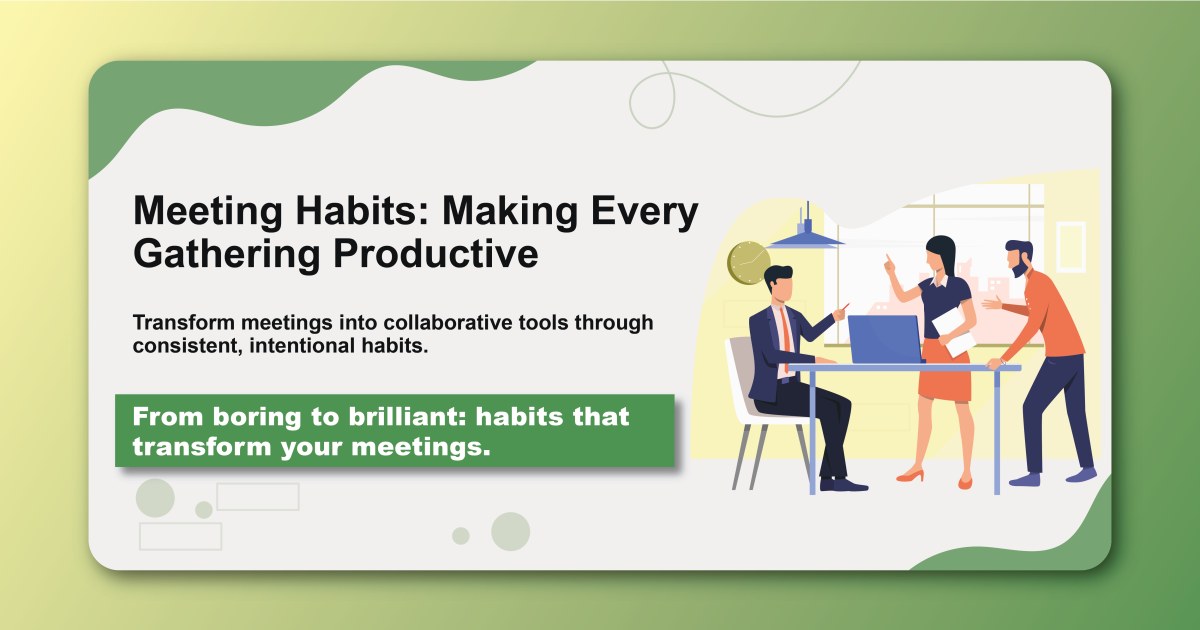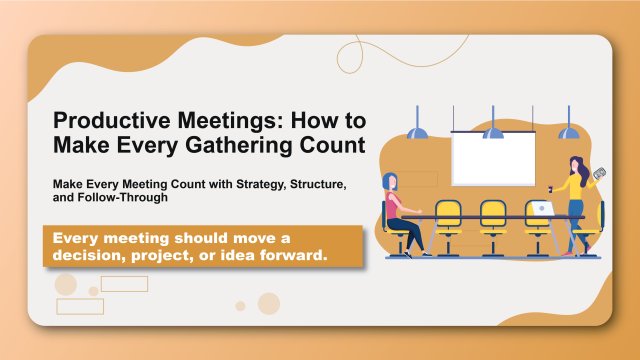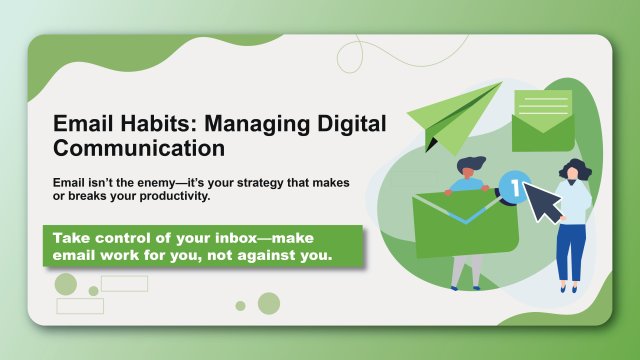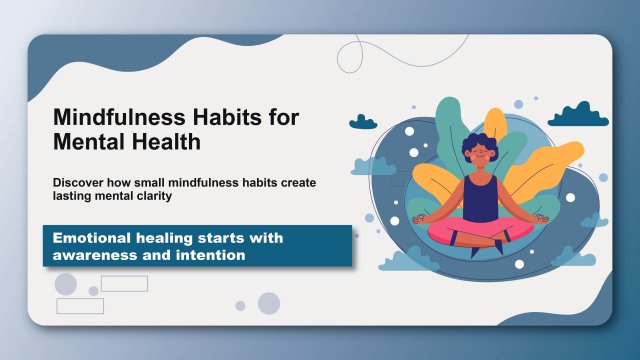Meetings are one of the most polarizing aspects of modern work life. When done well, they can drive collaboration, accelerate decision-making, and build team alignment. When done poorly, they become time-wasters that frustrate participants and hinder productivity. The difference between effective and ineffective meetings lies not in luck or natural talent, but in the deliberate habits that meeting organizers and participants develop around planning, conducting, and following up on meetings.
The statistics around meeting effectiveness are sobering: the average executive spends 23 hours per week in meetings, with 67% reporting that they spend too much time in meetings. Yet meetings remain essential for collaboration, decision-making, and relationship building in most organizations. The challenge is not to eliminate meetings but to make them more purposeful, efficient, and productive.
Effective meeting habits transform meetings from necessary evils into powerful tools for achieving business objectives. These habits include thorough preparation, clear agenda setting, active facilitation, purposeful participation, and systematic follow-up. When these habits become automatic, meetings become catalysts for progress rather than obstacles to productivity.
The shift to remote and hybrid work has made meeting effectiveness even more critical. Virtual meetings present unique challenges that require adapted skills and new habits. However, they also create opportunities for increased efficiency and broader participation when managed well. The key is developing habits that work across different meeting formats and contexts.
This comprehensive guide explores the daily habits that transform meetings from time-consuming obligations into productive, engaging experiences that drive results and build relationships. Whether you're a meeting organizer or participant, these habits will help you make every gathering count.
The Foundation of Meeting Excellence
Understanding Meeting Purpose
Meetings as Tools Effective meetings are tools for achieving specific objectives, not just opportunities for people to gather and talk.
Clear Objectives Every meeting should have a clear purpose that can be articulated in one sentence and specific outcomes that can be measured.
Value Creation Meetings should create value that justifies the time investment of all participants.
Collaboration Focus The best meetings facilitate collaboration that couldn't happen as effectively through other means.
Meeting Effectiveness Principles
Preparation Over Improvisation Effective meetings are built on thorough preparation rather than improvisation.
Participation Over Presentation Great meetings emphasize participation and engagement over one-way information sharing.
Action Over Discussion Productive meetings focus on decisions and actions rather than endless discussion.
Follow-up Over Forgetfulness Meeting value is created through systematic follow-up and implementation of decisions.
Pre-Meeting Preparation Habits
Strategic Planning
Purpose Clarity Define the specific purpose and desired outcomes before scheduling any meeting.
Purpose Definition:
- Identify the specific problem or opportunity to address
- Define what success looks like for the meeting
- Determine if a meeting is the best way to achieve the objective
- Consider alternative approaches before defaulting to a meeting
- Articulate the purpose in a single, clear sentence
Participant Selection Carefully select participants based on their ability to contribute to the meeting's objectives.
Selection Criteria:
- Include decision-makers who can approve or implement solutions
- Invite subject matter experts who can provide necessary insights
- Include stakeholders who will be affected by decisions
- Limit participation to essential contributors
- Consider who needs to be informed versus who needs to participate
Agenda Development Create detailed agendas that guide the meeting toward its objectives.
Agenda Best Practices:
- Start with the meeting purpose and desired outcomes
- List specific topics with time allocations
- Include discussion questions and decision points
- Identify who will lead each agenda item
- Share agendas in advance to allow for preparation
Logistical Excellence
Scheduling Optimization Schedule meetings strategically to maximize participation and energy.
Scheduling Strategies:
- Consider participants' energy levels and schedules
- Avoid back-to-back meetings when possible
- Choose times that work for the most critical participants
- Use calendar blocking to protect focused work time
- Default to shorter meeting durations
Technology Preparation Ensure all technology and logistics are prepared in advance.
Technology Readiness:
- Test all technology before the meeting
- Prepare backup plans for technical issues
- Ensure all participants have access to necessary tools
- Share meeting materials in advance
- Set up the physical or virtual meeting space appropriately
Meeting Facilitation Habits
Opening and Setting Direction
Strong Starts Begin meetings with clear direction and energy.
Opening Practices:
- Start on time regardless of late arrivals
- Review the agenda and objectives
- Set ground rules for participation
- Check in with participants about their readiness
- Create energy and engagement from the beginning
Expectation Setting Establish clear expectations for participation and outcomes.
Expectation Management:
- Communicate meeting norms and guidelines
- Clarify decision-making processes
- Set expectations for participation levels
- Establish time boundaries and commitments
- Review any pre-work or preparation requirements
Active Facilitation
Discussion Management Guide discussions productively toward desired outcomes.
Discussion Techniques:
- Ask open-ended questions to encourage participation
- Keep discussions focused on the agenda
- Manage dominant personalities and encourage quieter participants
- Use structured discussion formats when appropriate
- Intervene when discussions become unproductive
Time Management Manage meeting time to ensure all objectives are addressed.
Time Management Practices:
- Use timekeeping to stay on schedule
- Allocate time based on importance and complexity
- Be willing to table less important items
- Take breaks during longer meetings
- End meetings on time as promised
Decision Making Facilitate clear decision-making processes.
Decision Facilitation:
- Clarify what decisions need to be made
- Use structured decision-making frameworks
- Ensure all relevant perspectives are heard
- Document decisions clearly
- Identify next steps and accountability
Participation Encouragement
Inclusive Participation Create environments where all participants can contribute effectively.
Inclusion Strategies:
- Use techniques to encourage participation from all attendees
- Manage power dynamics and personality differences
- Create psychological safety for sharing ideas
- Use breakout groups and small group discussions
- Vary participation methods to accommodate different styles
Engagement Maintenance Keep participants engaged throughout the meeting.
Engagement Techniques:
- Use interactive elements and activities
- Vary the pace and format of discussions
- Encourage questions and clarifications
- Use visual aids and collaborative tools
- Monitor energy levels and adjust as needed
Meeting Participation Habits
Preparation and Engagement
Pre-Meeting Preparation Come to meetings prepared to contribute meaningfully.
Preparation Practices:
- Review agendas and materials in advance
- Prepare thoughts and questions on key topics
- Complete any assigned pre-work
- Bring necessary materials and resources
- Clear your mind and focus on the meeting
Active Participation Engage actively and constructively in meeting discussions.
Participation Strategies:
- Listen actively to others' contributions
- Ask clarifying questions when needed
- Share relevant insights and expertise
- Build on others' ideas constructively
- Stay focused on the meeting rather than other tasks
Professional Meeting Behavior
Respectful Communication Communicate respectfully with all meeting participants.
Communication Practices:
- Listen without interrupting
- Speak clearly and concisely
- Acknowledge others' contributions
- Disagree respectfully when necessary
- Avoid side conversations and distractions
Accountability and Follow-Through Take responsibility for commitments made during meetings.
Accountability Practices:
- Clarify your understanding of assignments
- Commit to realistic timelines
- Follow through on all commitments
- Communicate proactively about challenges
- Report back on progress as requested
Post-Meeting Follow-Up Habits
Documentation and Communication
Meeting Documentation Document meeting outcomes and decisions systematically.
Documentation Practices:
- Create clear meeting notes or summaries
- Document decisions and action items
- Identify owners and timelines for follow-up actions
- Share documentation with all participants
- Store meeting records in accessible locations
Communication Follow-Up Communicate meeting outcomes to relevant stakeholders.
Communication Strategies:
- Send meeting summaries to all participants
- Communicate decisions to affected stakeholders
- Update relevant project management systems
- Share outcomes with team members who couldn't attend
- Provide regular updates on action item progress
Implementation and Tracking
Action Item Management Manage action items systematically to ensure implementation.
Management Practices:
- Track action items in project management systems
- Set reminders for follow-up actions
- Check in with action item owners regularly
- Escalate overdue items appropriately
- Celebrate completion of major initiatives
Progress Monitoring Monitor progress on meeting decisions and commitments.
Monitoring Strategies:
- Schedule follow-up meetings when appropriate
- Include action item reviews in future meetings
- Track progress on key initiatives
- Adjust timelines and resources as needed
- Learn from implementation challenges
Meeting Optimization and Improvement
Continuous Improvement
Meeting Evaluation Regularly evaluate meeting effectiveness and identify improvement opportunities.
Evaluation Methods:
- Collect feedback from meeting participants
- Assess whether meeting objectives were achieved
- Analyze time efficiency and participation levels
- Identify what worked well and what didn't
- Compare actual outcomes to intended outcomes
Process Refinement Continuously refine meeting processes based on experience and feedback.
Refinement Strategies:
- Experiment with different meeting formats
- Adjust agenda structures based on what works
- Modify facilitation techniques
- Update meeting technology and tools
- Adapt to changing team and organizational needs
Meeting Alternatives
Alternative Communication Methods Consider alternatives to meetings when appropriate.
Alternative Options:
- Email updates for information sharing
- Collaborative documents for input gathering
- Quick phone calls for simple decisions
- Asynchronous video messages
- Project management tools for status updates
Meeting Format Optimization Use different meeting formats for different purposes.
Format Options:
- Stand-up meetings for quick updates
- Working sessions for collaborative tasks
- Decision-making meetings for critical choices
- Brainstorming sessions for creative work
- Review meetings for evaluation and feedback
Virtual Meeting Excellence
Technology Mastery
Technical Preparation Master the technology needed for effective virtual meetings.
Technical Skills:
- Become proficient with video conferencing platforms
- Use collaboration tools effectively
- Manage screen sharing and presentations
- Handle technical issues gracefully
- Optimize audio and video quality
Engagement Strategies Develop strategies for maintaining engagement in virtual environments.
Virtual Engagement:
- Use interactive features like polls and breakout rooms
- Encourage video participation when appropriate
- Vary presentation formats to maintain interest
- Create opportunities for informal interaction
- Monitor participant engagement levels
Remote Meeting Etiquette
Virtual Meeting Norms Establish and follow norms for virtual meeting participation.
Virtual Etiquette:
- Join meetings on time and prepared
- Mute when not speaking
- Use appropriate backgrounds and lighting
- Minimize distractions and multitasking
- Communicate clearly about technical issues
Effective meetings are not accidents—they're the result of deliberate habits and practices that create value for all participants. By developing strong meeting habits around preparation, facilitation, participation, and follow-up, you can transform meetings from time-wasters into powerful tools for collaboration and achievement.
Remember that meeting effectiveness is a skill that improves with practice and intentional development. Whether you're leading meetings or participating in them, the habits outlined in this guide will help you make every gathering more productive, engaging, and results-oriented.
The key is to start with the habits that address your biggest meeting challenges and gradually build a comprehensive approach to meeting excellence. Great meetings don't just happen—they're created through consistent application of proven practices that respect everyone's time and create meaningful value.
Ready to transform your meetings into productivity powerhouses? Start building your meeting excellence habits with Habityzer and discover how strategic practices can make every gathering count toward your professional success.



